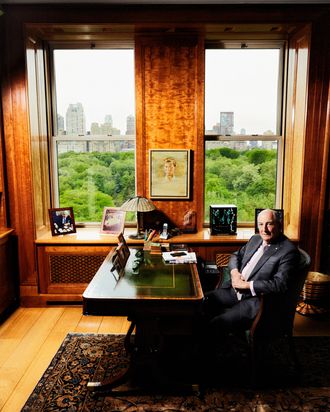
On the Tuesday after the Monday when Donald Trump officially moved the U.S. Embassy in Israel from Tel Aviv to Jerusalem, his daughter and son-in-law performing pseudo-diplomacy and wearing mannequin smiles as Israeli soldiers shot live ammunition into crowds of protesters in the Gaza Strip, killing 60 people, I arrived at the 16th-floor Park Avenue suite of the Jewish philanthropist Charles Bronfman. The previous week, in an address to Hebrew Union College, Bronfman had seemed to pick a fight with the government of Israel — a surprising and unprecedented act for a man who has spent his whole life and hundreds of millions of his own dollars investing in Israel, promoting it to Americans, and defending its right to defend itself. The co-founder of Birthright Israel, which sponsors free trips for young Jews to the homeland, turns 87 next month, and when he greeted me, gallantly offering to carry my gym bag, he looked, in his pale-pink shirt, every inch the dapper billionaire. I am Jewish, and still rattled from the news of the bloodshed, I sat on his couch with my back to the busy view and used the word heartbroken.
Bronfman shrugged existentially, an open-palmed gesture that evoked generations. “They’re all bad guys,” he said, meaning Hamas, Netanyahu, Trump, Javanka — the lot. “Why did the Israelis use live fire? Why didn’t they use water cannons and why didn’t they use tear gas and why didn’t they use rubber bullets? I can’t answer any of this stuff. Nobody’s an innocent lamb in this thing. It is such a terrifying situation all around.”
Establishment patriarchs used to not talk like this to reporters. Among American Jews, the ground rules were clear: Like members of a contentious family, the leaders of Jewish organizations may have had their disputes with Israel, but, also like family, they were expected to air those grievances in private.
This “family” tradition can create odd partnerships and theatrical tensions. About two weeks before his HUC speech, Bronfman honored the casino magnate Sheldon Adelson and his wife, Miriam, at the Birthright gala as “guardians of the Jewish future” — thanks for their $70 million gift to Birthright, which raised their lifetime contributions to a whopping $410 million. Adelson, who gave $83 million to Republicans in 2016 and $5 million to Trump’s inaugural fund, has become Birthright’s main funder. “We’re not friends,” Bronfman says bluntly. “We’re not enemies, but we’re not friends. It’s a difficult situation. He and I are on opposite spectrums. I’m not that far left, but he’s very far right. We have nothing in common. Period.”
Many younger, left-leaning Jews in America have for a decade or so felt freer to speak, seeing in the Palestinian condition a human-rights trauma and using words like theocracy and apartheid to describe the state their great-grandparents fought for and loved. Their elders have typically preferred to stay mum, but something has changed lately.
Perhaps they’re exasperated with Israeli prime minister Benjamin Netanyahu: his corruption imbroglio; his smug alliance with Trump; or his public repudiation of Barack Obama, whose attempt in 2015 to defang Iran in a nuclear deal met with Bibi’s unguarded contempt. In March, Ronald Lauder, the head of the World Jewish Congress — and a Republican — wrote an explosive op-ed warning that the government of Israel faces “a stark choice: Grant Palestinians full rights and cease being a Jewish state or rescind their rights and cease being a democracy.” Six weeks later, Bronfman made his speech, saying he was “perplexed and angry” about Netanyahu’s capitulation to the hard-line, ultra-Orthodox coalition in the Knesset and proposing a watchdog lobby to promote moderation.
What particularly infuriates Bronfman is the discrimination of the Israeli government against the Jews of the diaspora, like himself, whose religious observance is more relaxed. In Israel, the religious authorities are ultra-Orthodox. According to them, either Bronfman — a member of Central Synagogue, a Reform congregation in midtown (“NOT a member of BJ,” he clarifies in an email, referring to a competing shul across town) — nor any of his Reform, Reconstructionist, Conservative, or Modern Orthodox friends is properly Jewish. “The hard-liners, the Halacha people, say, ‘We are the ones that are chosen by God, and the other ones are a bunch of bums and intermarriage is a sin,’ ” Bronfman says. “And Reform Jews are worse than Christians because they’re traitors.”
In his speech, Bronfman left no mistake about his target. “Can a prime minister really claim to be a guardian of the entire Jewish people when he reneges on a carefully crafted agreement knowing that he will suffer no political consequences at home?” He was referring, as nearly everyone present would have understood, to Netanyahu’s last-minute abandonment last summer of an agreement, designed with the support of members of the right-wing American pro-Israel lobby AIPAC, to designate a small portion of the Western Wall for men and women to pray together. (Currently, in accordance with Orthodox tradition, there is mandated sex segregation at Judaism’s holiest site.) But under pressure from the right, Netanyahu withdrew his support and Bronfman was compelled to write a letter, imploring the prime minister to “do what’s right instead of what’s politically expedient.”
In theory, Bronfman might have used this same exhortation on Trump about his decision to move the embassy — not that Bronfman was strictly opposed. Netanyahu has wanted an ally in the White House on this issue since he was first elected in 1996, and though previous presidents have paid lip service, no one took it seriously until Trump. The international community maintains the “contested” status of Jerusalem, and to claim it unilaterally as “the capital of Israel” is to give the finger, politically speaking, to the Palestinians in Israel, and to all those who take the Palestinian complaint seriously, and to a far larger number who are looking beyond Israel’s borders to the terrifying power shifts in the Middle East, to Syria and Iran and Lebanon and Turkey and Saudi Arabia, and who believe in the crucial necessity of diplomacy over displays of force — a number that includes a whole lot of Jews. According to a poll by the American Jewish Committee, only 16 percent of American Jews wanted the embassy moved right away, but no matter: The same constituency that is politically irrelevant to Netanyahu is irrelevant to Trump. Evangelicals, Trump’s base, support the move.
Bronfman is on the board of the Israel Policy Forum, which supports a two-state solution, and has long regarded a possible move as a potentially useful bargaining chip in the larger game of negotiating a peace. When he ascertained last year that Trump was earnest about following through, “I said, ‘Well, he’s got to give something to the other side.’ And then when he didn’t, I said, ‘That’s very strange. If he wants to have a peace plan and starts out totally committed to one side, that seems like a strange way to start.’ ” (Bronfman, who like Trump has a house in Palm Beach, has been to Mar-a-Lago for dinner, but “we have not been there recently, and I don’t envisage us going there.”)
He recounts that he was at a dinner in a Manhattan club recently, hosted by the think tank the Institute for National Security Studies. Jason Greenblatt, Trump’s Israel adviser, was there. He was asked about the timing of a proposed peace deal, and, though he waffled on the specifics, he assured his dinner companions that they were working hard. “But you don’t know with whom,” agonized Bronfman. “And you don’t know who ‘we’ are.” Another pause; no shrug this time. “What you have to do — what I’m doing right now — is hoping. But I hope without any expectation.”
And so, in the spirit of shared existential crisis, I asked Bronfman to assess the wisdom of the embassy move now. Still hesitant to level a direct critique, he equivocated. It could be terrible. But! It could be terrific.
“How could it be terrific?” I asked.
“Is there a possibility that something good can come out of this? If there isn’t, they’ve made a huge, huge mistake. If there is, it’ll surprise the heck out of all of us.” And then, another gigantic shrug.
*This article appears in the May 28, 2018, issue of New York Magazine. Subscribe Now!






























